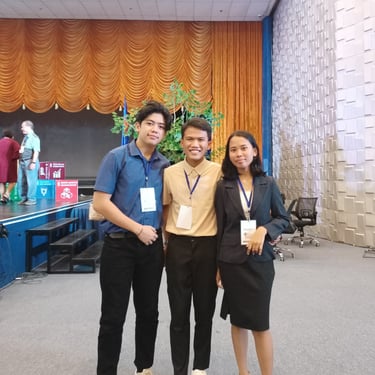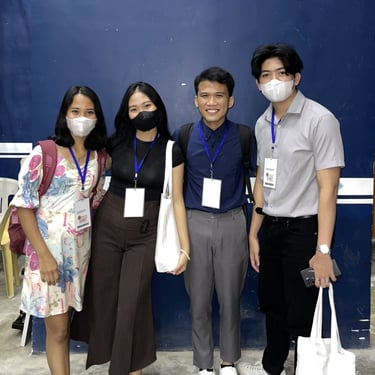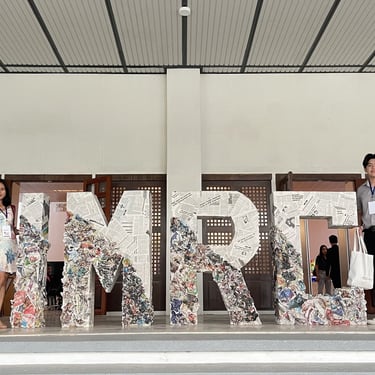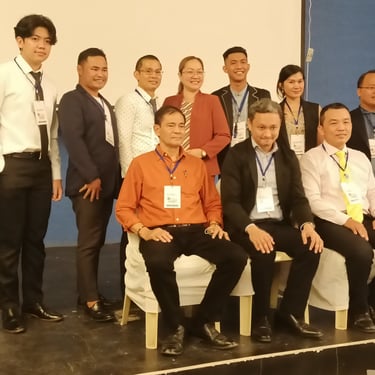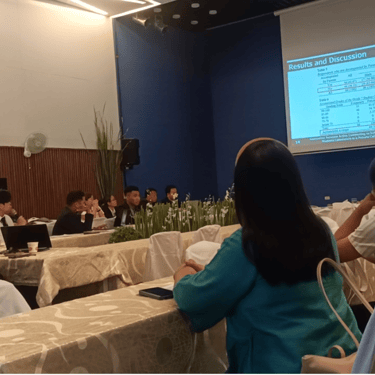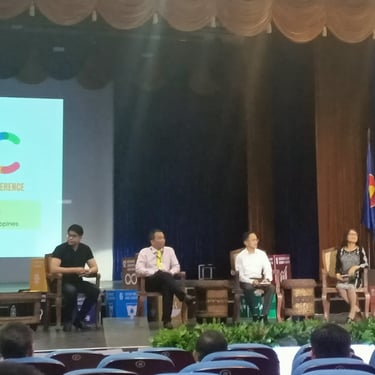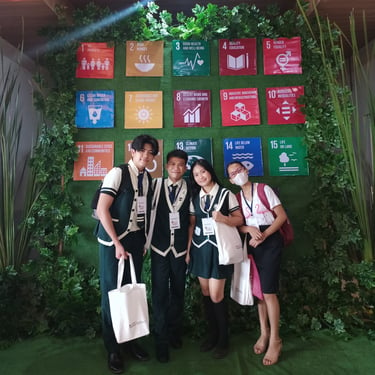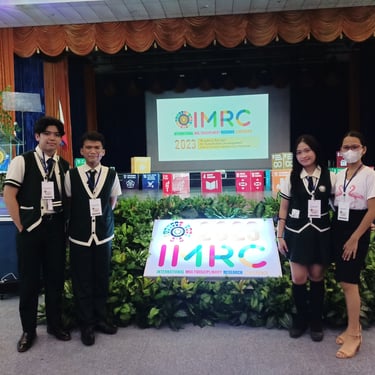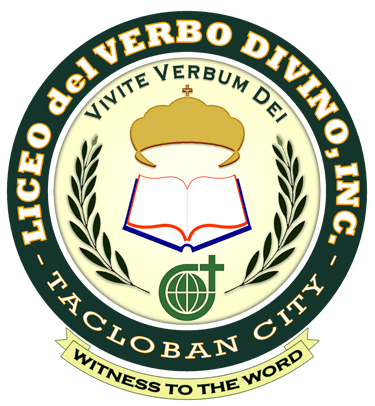Novice researchers converge to breaking barriers for sustainable dev’t via IMRC
Selected Divinians presented their completed research studies at the International Multidisciplinary Research Conference (IMRC) in Leyte Normal University (LNU), Tacloban City last June 27-29, 2023.
There were five abstracts submitted yet only four qualified in the sub-themes of the conference providing the Grade 12 novice student-researchers of Liceo del Verbo Divino, Inc. (LVD) an avenue to participate in the knowledge exchange of scholars. The school was represented by Kiyomi Kei A. Campo, Erich G. Acedillo and Von Jethro O. Simborio with Mr. Ronnie O. Daganasol, their research teacher, as co-presenters of their respective research studies.
IMRC aims to disseminate research outputs in various disciplines geared toward sustaining global competitiveness, thereby empowering academicians, educators, and industry players to further themselves in their respective fields. The conference commenced with the opening message delivered by Dr. Evelyn B. Aguirre, university president of LNU, where she centered her talk on this year’s theme, “Breaking Barriers for Sustainable Development” by emphasizing that breaking barriers around the 17 sustainable development goals (SDGs) can be manifested through knowledge exchange between key players. Involving the participants in engaging discussions as intellectual exchange eventually forges collaboration to foster lasting discussion and partnership. They become game changers who can amplify their impacts through their determination and unwavering commitment to pursuing research. She stressed that the conference is a worthwhile gathering which can break barriers for sustainable communities through global solidarity.
All the participants were formally welcomed to the event with the message of Hon. Alfred S. Romualdez, Tacloban City Mayor, highlighting the imperativeness of eradicating poverty complemented with evidence-based inputs. These inputs aid in full-support innovation, which subsequently develops an economically strategic outline to create a more sustainable future for the children of the present generation and their children. It was followed by the keynote address of Hon. Ferdinand G. Romualdez, the speaker of the House of Representatives Republic of the Philippines, who was equally represented by Congressman Jude Avorque. His talk started by describing the economic value put into research and development, and the role of the legislative branch. Legislators play a pivotal role by designing significant strides toward achieving SDGs. Strides primarily require concerted efforts and insights to illuminate the path toward SD and uplift the lives of many by applying the results in daily life; hence, research is their beacon to foster a sustainable future for all. After his talk, an open forum was conducted to entertain questions from the participants. Questions were raised like what aggressive steps they take and overview of their strategic plans. He responded that graduate education sets the bar and access to pharmaceutical services including clinical trials lack in the region. They have high hope that they can achieve all SDs no later than 2030.
In the afternoon, parallel sessions for batch 1 after the plenary discussions on accelerating SDGs 1, 2, 3, 4, 5, 8, 10 and 16 were elaborated by selected discussants. The school’s participants have presented their research studies in their respective tracks: Von Jethro O. Simborio for “Association Between Active Commuting to School and Academic Performance of Grade 7 Student Commuters in Private Catholic Institution”, Erich G. Acedillo for “Sex Education as Academic Subject: Perception of Employees and Students of a Catholic Institution”, and Kiyomi Kei A. Campo for “Effectiveness of Using Sugarcane Bagasse as Alternative Component in Producing Cardboard” in SDG 4: Quality Education, SDG 5: Gender Equality, and SDG 9: Industry, Innovation and Infrastructure, respectively. A welcome dinner for the participants marked the end of the first day of the three-day conference.
On the second day, announcements and recap of Day 1 were reiterated, and a message from Comm. Aldrin A. Darilag, LNU-BOR Chair was sought before the start of the parallel sessions for batch 2 for SDG 4: Quality Education, SDG 11: Sustainable Cities and Communities, and SDG 14 AND 15: Life Below Water and On Land. Mr. Ronnie O. Daganasol, the school’s teacher-participant, presented his paper titled, “A Scoping Review on the Students’ Misconceptions in Natural Selection” in SDG for Society and Culture in the afternoon. There were parallel sessions conducted simultaneously for SDG 4: Quality Education and SDG 11: Sustainable Cities and Communities. The day ended with the plenary forum for accelerating SDGs 6, 7, 11, 12, 13, 14, 15 and 16.
The last day of the conference was concentrated on the recognition ceremony and closing program. A recap of Day 2 was presented, and the proceeding report titled “Mechanisms that Emerge as a driver in breaking barriers for SDG” was discussed by Dr. Jonas P. Villas, the Executive Director of ORI and conference co-chair. He also announced salient points for the 7th IMRC next year. Recognition for the best papers and best oral presenters was awarded to the winners. The conference concluded with some impressions of selected participants and a closing message from Dr. Gil Nicetas B. Villarino, Vice-President of ORIE and conference co-chair. He asserted that the important thing is not to stop questioning to propel forward and believe that somewhere is waiting to be known and knowledge may fade through time if not advanced. Researchers’ work is truly commendable and the problems to be identified are encapsulated by SDGs. Completing a study is one giant leap for mankind because if we can do better, then, we can do so much.
There were key takeaways of the school participants upon attending the three-day research conference. Von Jethro shared the difference between his experience in presenting their study online at UP Cebu and on-site at LNU. He stressed, “The mode of presentation is different which is similar to the degree of anxiousness that I felt prior to the event. I was more anxious in face-to-face presentations because I need to look at the audience and judges to ensure their engagement and ultimately, figure out their reactions like whether they are satisfied with my answers to their questions. This significantly boosted my confidence in presenting our paper.” He also expressed his heartfelt gratitude to Sir Ronnie, their research adviser/teacher, whose unwavering support and guidance played a pivotal role in their participation in the IMRC. “His [Sir Ronnie] encouragement and belief in our research project empowered us to take this opportunity to present our study with confidence. Without his mentorship, we would not have realized the immense potential of our work to contribute to the pursuit of quality education,” he highlighted.
Additionally, both Kiyomi and Erich, believe that novice researchers like them can contribute to the existing body of knowledge, particularly by being instrumental in breaking barriers for sustainable development. “As one of the youngest researchers in intellectual exchange between professionals, the conference provided us an avenue that age should never be a barrier to making significant contributions to research and innovation; thus, breaking barriers for sustainable development,” they stated. The convergence of the key players leads to global solidarity by pursuing research that can subsequently break the barriers toward sustainable communities for future generations.
